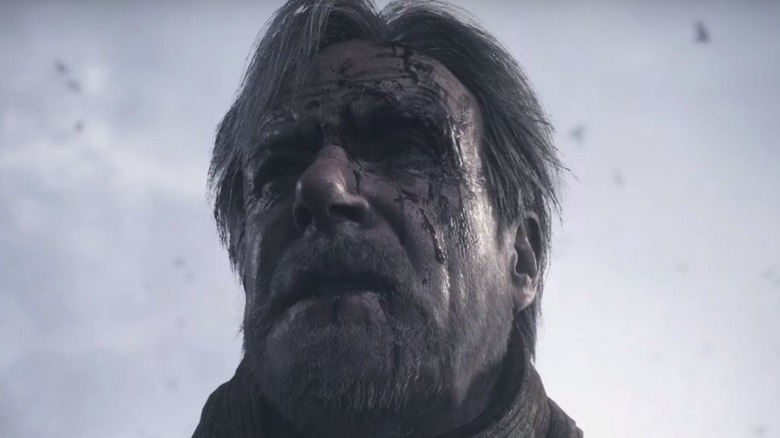Resident Evil Village Has Been Around A Lot Longer Than You Thought
Currently, gamers are flocking around "Resident Evil: Village" ahead of its May 7 release. Audiences can't get enough of the demo, which is why Capcom has extended the previously-short playtime window. The team behind the game is clearly confident that "Resident Evil: Village" will be a huge success, and that confidence is well-founded given its critically acclaimed precursor, "Resident Evil 7." However, developers have worked on "Village" for so long the team initially weren't even sure the game would be a full-on sequel, let alone a first-person horror title.
According to a recent interview with IGN, Capcom's "Resident Evil" team has been developing "Village" for way longer than "Resident Evil 7" has been on the market — six months longer to be exact. Director Morimasa Sato stated, "We were still busy developing 'Resident Evil 7,' but my boss told me to start planning for the next entry in the series."
As IGN points out, the practice of piling extra work onto a busy development plate is common in the game industry. For instance, Free Radical Design was tossing around ideas for a "Star Wars: Battlefront 4" while it was still developing "Battlefront 3" (and "Haze" and "TimeSplitters 4"). But unlike "Battlefront 3" and "4," which would have stuck close to the "Battlefront 2" model, "Resident Evil 7" was a series first due to its first-person perspective, and Capcom didn't know how audiences would react. Because "Resident Evil 7" was unproven at the time, the "Village" team was hedging its bets and fully prepared to fall back on what had worked in the past.
Sato explained, "We had no idea how the change of perspective would be received, so at first we were worried. But when we released 'Resident Evil 7' about half a year after the development of 'Village' started, it was received very well. This helped us decide to make 'Village' a direct sequel." Sato went on to describe "Village" as the "offspring" of "Resident Evil 4" and "Resident Evil 7."
While plenty of games have flip-flopped between visions during development (e.g., "Resident Evil 4" was originally supposed to feature ghosts and possessed dolls, which were left on the cutting room floor), the lengthy development time of "Resident Evil: Village" could have resulted in the exact opposite. Had "Resident Evil 7" not served as a guiding light, the story of Ethan Winters might have ended with that game, and "Village" could have been molded into an unrelated sequel as Sato and co. might have originally intended.

